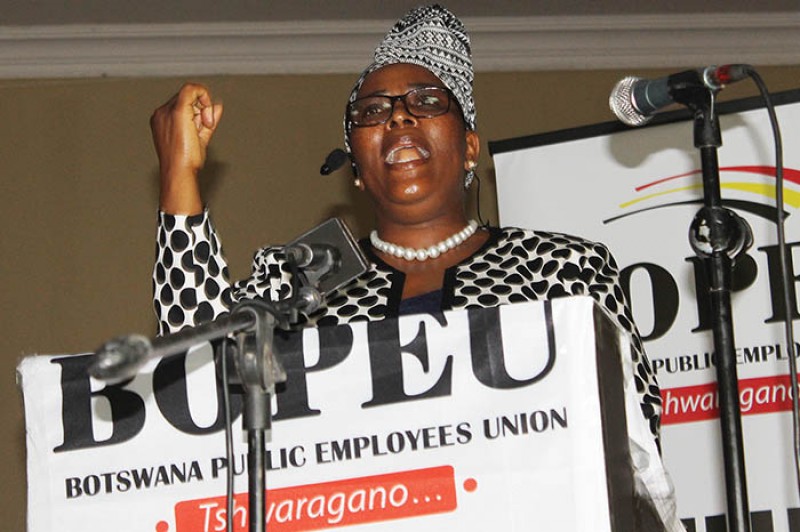BOPEU Constitution Provides For Infallible Presidency
Monkagedi Gaothobogwe | Monday November 30, 2020 17:35


This is what the panel of three judges found when deciding that a trade union or society dispute is best resolved by observing how the constitution defines the relationship amongst members and to stick by its constitutional intentions.
That was to be the end of Olefile Monakwe, who had since April last year usurped the powers of president from Masego Mogwera and further toppled secretary-general Topias Marenga, going on to make other drastic changes in the make up of BOPEU’s structures.
The panel of three judges concluded that voluntary associations such as trade unions are generally governed by their constitutions.
“The constitution is the charter of the association, which expresses the rights and obligations of each member and also regulates those rights and obligations.”
Elsewhere the judges observed that he basic foundation of a trade union like BOPEU is the mutual agreement amongst its members and between the members and itself.
“The contract amongst its members between the members and the trade union is embodied in the constitution. The constitution manifests the members’ agreement to the essential characteristics, objects and the purpose of the union and it constitutes a contract concluded by way of offer and acceptance, expressing amongst others the intention of the members to associate with one another.”
The panel of three judges that on Friday concluded the long-running saga that is the factional war over BOPEU presidency and secretary-generalship, amongst others, decided that such cases are best considered observing what the constitution of the union says regarding resolving of issues.
It is here that the three judges’ conclusion and findings ran short of declaring that BOPEU’s constitution creates one of the most powerful presidents that is not designed to be toppled by anyone, not even a NEC majority.
Outlining the powers of the president, the three judges found that a BOPEU president is empowered to suspend any member of the NEC in the interest of the union, pending the review of her or his decision by the NEC later.
The judges’ panel also found that even in situations where the majority differ with her (his) position, the president of BOPEU is empowered by the constitution to have the last and final word.
The BOPEU constitution does not only make Mogwera the head and chief spokesperson of the union, but she is the only one in their constitution bestowed with the powers to interpret policy direction as well as possessing the sole responsibility of interpreting the constitution in cases of ambiguity. Simply put the BOPEU constitution cloaks its president with powers of infallibility.
According to the findings of the recently concluded court case, a BOPEU NEC meeting without the blessing or the presence of the president is of no constitutional effect, even in situations of acrimonious relations, which had characterised BOPEU climate in the last two years.
In fact, the first deputy president is constitutionally toothless and only derives any authoritative powers by cooperating with a BOPEU president who can decide to delegate the first deputy or not, to chair proceedings. When the BOPEU president decided to end the meeting of April 27, 2019 and walked out with the secretary-general, the actions of her first deputy president and the majority of the committee to continue to convene another meeting and take resolutions to expel the president and secretary-general were found by the court on Friday to be legally inconsequential, invalid, unconstitutional and null and void.
In fact, there is no room for factional wars in the constitution of BOPEU as it only provides for peace and cordial working relations with the president.
In factional wars the BOPEU constitution chooses to follow and obey only the president and nobody else.
When it comes to suspensions of NEC members, the BOPEU constitution is clear that such a member to be suspended is not intended to be its president by inserting the clause that empowers only the president to suspend a member of the National Executive and not the other way round, making a president of BOPEU simply untouchable.
Another powerful figure in the BOPEU onstitution appears to be the secretary-general, behind his (her) back no legally formulated NEC meetings can be convened. The BOPEU constitution tasks the secretary-general, in conjunction with the president for the convening of NEC meetings.
His minutes are used as the legitimate official records and ultimate reference as to how a particular meeting progressed. Any other document purporting to be records of the meeting, but not signed by the secretary-general won’t stand in a court of law, as it was shown in court on Friday where the panel of three judges rejected as invalid and illegal the decision by a certain head of administration at BOPEU to convene the April 27 NEC meeting without the consent or delegation of the secretary-general of BOPEU, in this case the secretary-general being Marenga.
